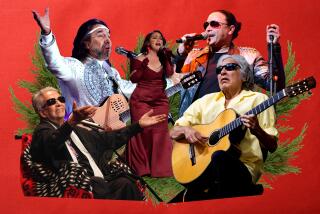The Rediscovery of Manuel de Falla
- Share via
Possibly as a direct consequence of last year’s Columbian Quincentennial, the recording companies in 1992 showed unprecedented interest in the music of Manuel de Falla, with its strong ties to Spain, where he was born in 1876, and to the New World, where he died (in Argentina) in 1946.
That spurt of activity on his behalf, the products of which have been appearing in recent months, may gain richly deserved respect for a composer who has been too widely regarded as a purveyor of folksy Spanish pop.
Not that his music isn’t Spanish. Rather, it is representative of a sophisticated take on nationalism that employs music of Spain’s diverse cultures to create a distinctive modern style.
“El Amor Brujo” ranks among Falla’s most popular works, but in the composer’s 1924 version for large orchestra that considerably diminishes the impact of the 1915 original for chamber forces.
The 1915 “Amor Brujo” is a half-hour theater piece about darkly amorous doings among Andalusian Gypsies. It enlists a singer and actor-dancers in addition to the small orchestra, and it is in this form (without the dancing, of course)--complete with Spanish spoken text--that it has now been recorded by the Lausanne Chamber Orchestra under direction of Jesus Lopez-Cobos, with mezzo-soprano Alicia Nafe and actors Silvia Aguilar and Antonio Belda Egea (Denon 75339).
The performance, while superbly accomplished in all respects, refuses to polish away the raw, naturalistic edge that marks this colorful score.
Denon’s companion piece is the Seven Spanish Folk Songs, arrangements by Falla of traditional material that emerge sounding as much his own as do Bartok’s similar services in behalf of Hungarian folk music.
The songs are presented here in Luciano Berio’s tastefully spare (if with a bit too much castanet-ing) orchestrations of the piano-accompanied originals, sung with cool aplomb by the Argentine Nafe.
The same seven, this time in an earlier, equally apt orchestration by Falla’s friend and collaborator Ernesto Halffter, are delivered with vast charm and remarkable agility by Victoria de los Angeles in a recording made last year, when she was 68 years old.
This treasurable Falla concert (Harmonia Mundi 901432) also has the soprano offering some haunting, medieval-sounding music for Calderon’s play, “El gran teatro del mundo,” and the sexy “Psyche,” an homage to Debussy. Both are sung with purity of tone and subtle textual insinuation by the seemingly ageless De los Angeles.
The program is completed by an exhilarating performance of the Concerto for Harpsichord and Five Instruments, a clever amalgam of the keyboard technique of Domenico Scarlatti, Spanish melos and taut, Stravinskyan rhythmic inflection.
The instrumental contributions, from the chamber orchestra of Barcelona’s Teatre Lliure conducted by Josep Pons, are all of high quality.
Another Harmonia Mundi release (905213) devoted to Falla also presents the original, intimate “Amor Brujo,” but without the spoken portions and with the dubious enhancement of an “authentic” Gypsy cantaor growling her way through the songs.
The value of this disc lies elsewhere, in the tiny opera (like “Amor Brujo,” about 30 minutes long) “El Retablo de Maese Pedro” (Master Peter’s Puppet Show).
This is Falla’s musical translation for three singers and small orchestra of the funny and touching episode in Cervantes’ “Don Quixote,” where the Don gets so involved in a damsel-in-distress play he is watching that he proceeds to behead the villains. Not realizing that they are only puppets--and that he has wrecked the show--the Don exits, the personification of knight-errantry triumphant.
“El Retablo” is, like the Harpsichord Concerto, a brilliant mix of styles that adds up to purest Falla.
Pons and his Barcelona forces, singers and instrumentalists alike, are keenly attuned to Falla’s cleverly entertaining tricks.
More to Read
The biggest entertainment stories
Get our big stories about Hollywood, film, television, music, arts, culture and more right in your inbox as soon as they publish.
You may occasionally receive promotional content from the Los Angeles Times.










